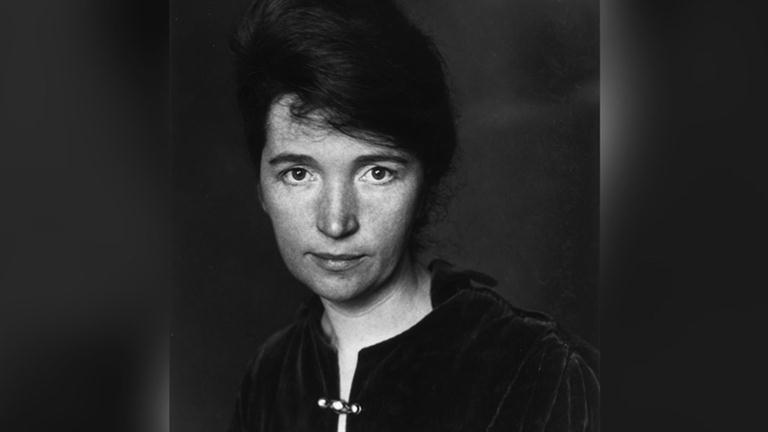In celebrating their 100th birthday, Planned Parenthood supporters continue to praise their founder Margaret Sanger (even featuring her on their 100 year website) while simultaneously attempting to distance the organization from her eugenicist beliefs. The problem is that they continue to hold Sanger up as an icon, despite her support of one of the most demeaning ideologies of recent centuries.
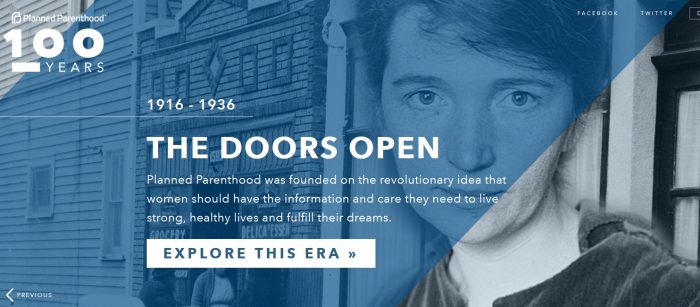
In celebrating their 100 year anniversary, Planned Parenthood says (as pictured above) the organization “was founded on the revolutionary idea that women should have the information and care they need to live strong, healthy lives and fulfill their dreams.” But is this true? Was Planned Parenthood really founded on those ideas? Not quite.

Alexander Sanger (image credit IPPF)
In an interview with Vox, Margaret Sanger’s grandson Alexander Sanger, who is the current Chair of the International Planned Parenthood Council and a former president of Planned Parenthood New York City, tried to gloss over his grandmother’s beliefs by claiming that she only “dabbled in eugenics”:
Now, she also dabbled in eugenics. She was not a full believer in all of eugenics, and disagreed with some of the things eugenicists believe in. But at various points in her life, she was opposed to women who she felt were incapable of being mothers from becoming mothers.
How does being “opposed to women who she felt were incapable of being mothers from becoming mothers” square with the idea that women should have “information” and be able to “fulfill their dreams,” as is advertised on the website graphic above? What if those women dreamed of motherhood? And we are supposed to believe that Sanger was some sort of feminist icon?
If Margaret Sanger was “not a full believer in eugenics” as her grandson suggests, it wasn’t where the so-called “unfit” were concerned. The founder of Planned Parenthood clearly advocated eugenic solutions for that “class of people” she deemed unworthy to have children, even calling for a “license to breed” and the permanent sterilization of those she deemed “feebleminded.” If Sanger differed from rank and file eugenicists, it was that she also supported those she called “fit” to voluntarily limit their children. In her autobiography, Sanger wrote:
Eugenics, which had started long before my time, had once been defined as including free love and prevention of conception. Moses Harman of Chicago, one of its chief early adherents, had run a magazine and gone to jail for it under the Comstock regime. Recently it had cropped up again in the form of selective breeding, and biologists and geneticists such as Clarence C. Little, President of the University of Maine, and C. B. Davenport, Director of the Cold Spring Harbor Station for Experimental Evolution, had popularized their findings under this heading…. I accepted one branch of this philosophy, but eugenics without birth control seemed to me a house built upon sands.
The fact is that despite the claims of Planned Parenthood’s supporters, not only did Sanger have a strong belief in eugenics, she made certain eugenics movers and shakers were deeply embedded in her organization. Below is a sample list of American Eugenics Society founders, leaders or members who were a part of Margaret Sanger’s board or organizations:

American Eugenics Society members on Margaret Sanger’s Board (Image credit: Maafa21)
And here is Margaret Sanger herself, listed as a member of the American Eugenics Society. Hardly a “dabble,” as her grandson has suggested:
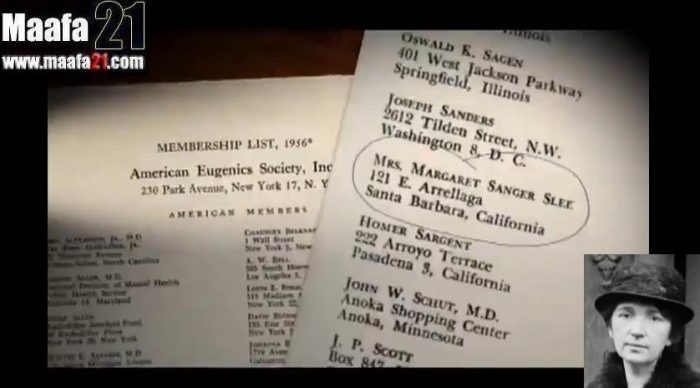
Planned Parenthood founder Margaret Sanger a member of the American Eugenics Society (image credit Maafa21)
Margaret was such a strong believer in eugenics that she even attempted to merge her publication with the Eugenics Society (which again doesn’t sound like “dabbling” to me). An April 1, 1925, article in the New York Times documented Sanger’s intentions:
Mrs. Margaret Sanger founder of the American Birth Control League, said that the league was ready to unite with the eugenic movement whenever the eugenists were able to present a definite program of standards for parenthood on a eugenic basis rather than a eugenic ideal.
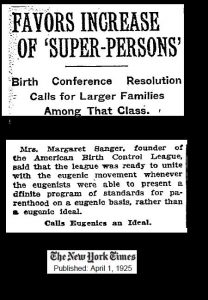
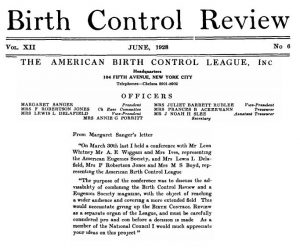 This letter, written by Sanger in June of 1928 and published in her Birth Control Review under the heading, “Shall the Birth Control Review be combined with a Eugenics Magazine?” Sanger details her meeting with American Eugenics Society representative, Leon Whitney, to merge her publication with that of the Eugenics Society in order to “reach[] a wider audience and cover[] a more extended field.” Whitney was the former executive secretary of the American Eugenics Society and Sanger willingly published his writings in her Birth Control Review.
This letter, written by Sanger in June of 1928 and published in her Birth Control Review under the heading, “Shall the Birth Control Review be combined with a Eugenics Magazine?” Sanger details her meeting with American Eugenics Society representative, Leon Whitney, to merge her publication with that of the Eugenics Society in order to “reach[] a wider audience and cover[] a more extended field.” Whitney was the former executive secretary of the American Eugenics Society and Sanger willingly published his writings in her Birth Control Review.
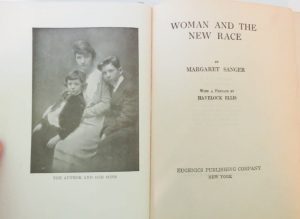 Some of Sanger’s writings, listed below, were even published by the eugenics movement (Source: Margaret Sanger, Pioneer of Birth Control, by Lawrence Lader and Milton Meltzer):
Some of Sanger’s writings, listed below, were even published by the eugenics movement (Source: Margaret Sanger, Pioneer of Birth Control, by Lawrence Lader and Milton Meltzer):
• What Every Mother Should Know, originally published by the Eugenics Publishing Co. in 1916
• What Every Girl Should Know, originally published by the Eugenics Publishing Co. in 1922
Planned Parenthood promoters try to convince the public that Sanger — a member of the American Eugenics Society who, by the way, also advocated for euthanasia — was simply a product of her day. But the facts paint a much different picture. Despite the evidence, Planned Parenthood’s supporters are working overtime to gloss over their founder’s beliefs.

Planned Parenthood Board Member Max Michael
In an op-ed praising abortion giant Planned Parenthood’s work as “health care equity,” Max Michael, MD, a member of the Planned Parenthood Southeast Board of Director, recently wrote:
Like many great organizations, Planned Parenthood is not without its flaws. While Planned Parenthood’s founder, Margaret Sanger, was a woman of tremendous achievement, she was also a flawed and imperfect leader. She devoted her life to enabling women to have control over when and whether to have children, yet she also had beliefs, practices, and associations that Planned Parenthood acknowledges, denounces and works to redress.
Michael’s words coincidentally seem to mirror Planned Parenthood’s published talking points.
Planned Parenthood proudly calls Sanger a “reproductive rights trailblazer,” “woman of heroic accomplishments,” and “a true visionary,” while at the same time claiming to denounce her views, even giving Sanger a pass for speaking to the Klu Klux Klan, writing:
However, it is true that Margaret Sanger made a speech on birth control to a women’s auxiliary branch of the Ku Klux Klan in Silver Lake, New Jersey, in 1926. Sanger’s passion to spread and mainstream birth control led her to speak to any group interested in learning how to plan their reproduction. Planned Parenthood strongly disagrees with Sanger’s decision to address an organization that spreads hatred (Sanger, 1938, 366).
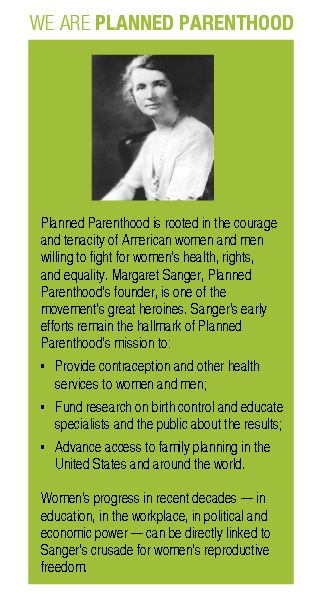
Planned Parenthood praises Margaret Sanger, 2008
Planned Parenthood leaves out the fact that Sanger was encouraged by the results of her speech to the Klan, saying, “In the end, through simple illustrations I believe I had accomplished my purpose. A dozen invitations to speak to similar groups were proffered.”
As the public learns the truth about Sanger’s beliefs, they tend to become less supportive of Planned Parenthood’s mission. It is this reality that likely prompted an unusual response from a Planned Parenthood spokesperson in 2011, after a member of the Humanist Community Forum in California asked her how she would respond to statements that Margaret Sanger was “such a racist.”
Guadalupe Rodriguez, Director of Public Affairs for Planned Parenthood Mar Monte in Silicon Valley, Alameda and San Mateo Counties, answered (watch the exchange at 37:44):
What we say is that she did make these statements – they were wrong then and they’re wrong now. We’re not standing by anything that she said–we’re not standing by her beliefs. We are a vastly different organization now than we were when she first started the group. We’ve evolved…. What we say is her statements and her beliefs were wrong then and they’re wrong now and we don’t stand with her – we are a different organization.
Planned Parenthood has a strange way of “denouncing” and “disagreeing” and not “standing by” Sanger’s beliefs — they named their most prestigious award after her. Sadly, even though Sanger’s beliefs were despicable, many journalists and politicians alike have accepted the infamous Margaret Sanger Award without hesitation.
Planned Parenthood’s doublespeak regarding Sanger is troubling, to say the least. The organization has called her one of the “greatest heroines,” while simultaneously denouncing her eugenic efforts. Privately, they acknowledge that Sanger’s vision was the foundation of Planned Parenthood’s mission. A 2008 Planned Parenthood of the Rocky Mountains annual report says of Sanger, “Sanger’s early efforts remain the hallmark of Planned Parenthood’s mission.”

